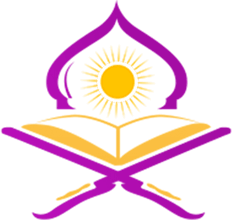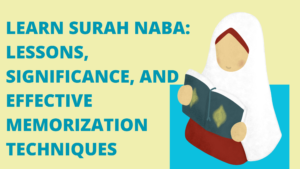Learning Quranic recitation is akin to mastering an exquisite art form, where language, melody, and meaning intertwine to create a masterpiece of spiritual enlightenment. Through the mastery of Arabic, the precision of Tajweed, and the depth of Tafsir, each recitation becomes a brushstroke on the canvas of divine revelation. Guided by mentors, seekers navigate this artistic journey, weaving their souls into the timeless tapestry of Quranic wisdom.
Undoubtedly, the Qur’an stands as the invaluable roadmap bestowed upon humanity by the All-Knowing Creator, Allah, guiding individuals along the path of righteousness and rescuing them from the bewildering complexities of life.
As such, it is paramount to immerse oneself in its profound teachings, for therein lies the key to unlocking the treasures of enlightenment and spiritual fulfillment. Recognizing its profound importance for both earthly existence and the afterlife, it’s natural to harbor questions about the practice of reciting the Qur’an. Let us delve into these inquiries together, seeking clarity and understanding.
Table of Contents
What Is the Quran Recitation Or Tilawah?
In the Arabic language, “tilawa” signifies the profound act of reciting the Qur’an, derived from the verb “tala,” which encompasses the multifaceted meanings of reading with deep contemplation, clarity, and consistency, while also adhering to and embodying its teachings.
Thus, Quranic recitation encompasses not only the mere pronunciation of words but a comprehensive engagement of one’s faculties and spirit. It involves:
- the eyes attentively scanning the verses or drawing upon memorized passages,
- the tongue and lips articulating the divine words with reverence,
- the mind pondering over their profound meanings, the heart resonating with their spiritual depth,
- and the entirety of one’s being aligning with the moral and ethical guidance conveyed by the Qur’an.
This holistic approach to recitation ensures a transformative experience, nurturing a profound connection with the sacred text and guiding believers towards spiritual enlightenment and moral upliftment.
Is the Qur’an Recitation the Same as the Qur’an Reading?
The distinction between “Qur’an recitation” and “Qur’an reading” lies in their depth of engagement and spiritual significance. While “reading” involves merely going through the text, “recitation” entails a deeper level of involvement, requiring one to internalize, understand, and embody the divine message conveyed by the Qur’an.
As Muslims, we are enjoined not merely to read the Qur’an but to recite it with sincerity, devotion, and a profound connection to Allah, seeking His guidance and mercy.
The first revelation emphasizes this, stating “Recite in the name of your Lord who created” [Al’Alaq: 1]. Proper recitation of the Qur’an is essential for attaining divine mercy and serves as a powerful reminder for those who believe:
[And is it not sufficient for them that We revealed to you the Book [i.e., the Qur’ān] which is recited to them? Indeed in that is a mercy and reminder for a people who believe.] [Sadd: 51].
How Important Is the Qur’an Recitation Learning?
As previously mentioned, “Iqraa” (Recite) is the first word revealed in the Qur’an, emphasizing the importance of recitation. It is obligatory for all sane, adult Muslims to recite the Qur’an correctly, as stated in the verse “[and recite the Qur’ān with measured recitation.]” [Al-Muzzamil: 4].
Additionally, teaching the correct recitation, including aspects like tajweed, is a sufficiency duty (fardh Kifaya) in Islam. A sufficient number of Muslims should be well-versed in the theoretical knowledge of recitation and specialized enough to teach others. This duty is highlighted by the Prophet Muhammad (ﷺ) who said, “The best amongst you is the one who learns the Qur’an and teaches it.” (Bukhari).
1- Roadmap for Behavior and a Framework for Life
The Quran serves as a comprehensive guide for navigating life’s challenges and uncertainties. It provides clear instructions on ethical conduct, interpersonal relationships, and moral values. By adhering to its teachings, individuals can cultivate a righteous character and lead a purposeful life aligned with divine guidance.
2- Reciting the Quran is Among the Best Acts of Worship
Reciting the Quran holds immense spiritual significance in Islam, ranking among the most virtuous acts of worship. It is a means of drawing closer to Allah, seeking His mercy, and attaining spiritual elevation. The Prophet Muhammad (ﷺ) emphasized the importance of reciting the Quran regularly, highlighting its transformative power and profound benefits for believers.
3- Mercy and Guidance for Humanity
The Quran is a manifestation of Allah’s mercy and guidance for all humanity. Its verses offer solace, wisdom, and enlightenment to those who seek divine guidance. Through the Quran, Allah extends His mercy to His creation, inviting them to embrace righteousness, seek forgiveness, and strive for spiritual growth.
4- Reward and Blessings
Reciting the Quran carries abundant rewards and blessings for believers. Each letter recited earns the reader immense spiritual merit, with multiplied rewards promised for sincere engagement with the Quran. The Prophet Muhammad (ﷺ) encouraged regular recitation of the Quran, affirming its status as a source of divine favor and blessings for those who dedicate themselves to its study and reflection.
5- The best among you are those who learn the Quran and teach it
Engaging with the Quran through recitation, memorization, and active learning is among the most virtuous acts in Islam. The Prophet Muhammad (ﷺ) emphasized the significance of learning and teaching the Quran, highlighting its transformative power for individuals and communities alike. Uthman ibn Affan (may Allah be pleased with him) narrated that the Prophet (ﷺ) said, “The best among you are those who learn the Quran and teach it.” The commitment to memorize and teach the Quran brings honor and success in both worldly life and the Hereafter.
6- Facilitating Quranic Study
Embarking on the journey of Quran memorization is facilitated by divine ease, as promised by Allah in the Quran. The Quranic text is designed for memorization and recitation, with its verses crafted for both preservation and comprehension. Establishing a consistent routine for Quranic study, including designated times for recitation and revision, ensures steady progress and deep understanding of its teachings. Reflecting on the Quran’s verses fosters a profound connection with its message and enhances spiritual growth.
7- Personal Commitment and Accountability
Devoting oneself to regular Quranic recitation requires a steadfast commitment and personal discipline. Allocating specific portions of the Quran for recitation during daily prayers and spare moments reinforces consistency and accountability. By adhering to a structured Quranic schedule aligned with daily prayers, individuals can effectively manage their time and maintain a balanced approach to Quranic study. Striving to uphold this commitment yields abundant spiritual rewards and strengthens one’s relationship with the Quran.
8- Transformative Power of Reflection
Delving into the Quran through memorization and reflection unlocks its transformative power and manifold benefits. Each verse recited with sincerity and understanding yields immense rewards and blessings from Allah. Reflecting on the Quran’s teachings fosters spiritual growth, guidance, and healing for the hearts and minds of believers. Embracing the multifaceted aspects of Quranic study, including contemplation, supplication, and seeking guidance, amplifies the impact of Quranic engagement and enriches the spiritual journey.
How to Learn Quran Recitation?
Mastery of Arabic language is crucial for accurate Quranic recitation, enabling comprehension of its message. Tajweed and Tafsir studies enhance recitation precision and deepen understanding of Quranic verses, requiring consistent practice and dedication for proficiency.
1- Mastery of the Arabic Language:
Mastering the Arabic language is paramount for any Muslim seeking to recite the Qur’an correctly. Since the Qur’an was revealed in Arabic, understanding the language is essential for comprehending its message. Learning Arabic encompasses vocabulary, grammar, syntax, and semantics, enabling a deeper understanding of the Qur’an’s verses and their nuances.
2- Study of Quranic Sciences:
Engaging in the study of Quranic sciences, such as Tajweed and Tafsir, further enhances one’s ability to recite the Qur’an accurately and understand its deeper meanings. Tajweed focuses on the rules and principles governing the proper pronunciation, articulation, and rhythm of Qur’anic recitation. Adhering to Tajweed rules ensures that each letter and sound is enunciated correctly, preserving the integrity of the Qur’an’s text.
3- Embrace Tajweed Principles:
Learning Tajweed principles provides a structured framework for reciting the Qur’an with precision and beauty. It involves mastering various aspects, including proper pronunciation of letters, rules of elongation (madd), characteristics of letters (makharij), and rules of pause (waqf). Adhering to Tajweed guidelines elevates the recitation to a melodious and eloquent level, enhancing the spiritual experience and conveying the intended meanings accurately.
4- Delve into Tafsir:
Studying Tafsir, or Quranic exegesis, deepens one’s understanding of the Qur’an’s context, themes, and interpretations. Tafsir elucidates the meanings of verses, historical background, linguistic nuances, and jurisprudential implications, providing invaluable insights into the divine guidance conveyed in the Qur’an. Delving into Tafsir enriches the recitation experience by unraveling the layers of meaning embedded in each verse, fostering a profound connection with the Qur’an’s message.
Tafseer can be simply identified as the interpretation of the ayahs of the Qur’an, according to Sunnah, and the right, affirmed understanding of the Companions, and their guided followers of scholars. Indeed, it helps you a lot to have a clear understanding of what you are reciting, and to get answers of questions you may have.
5- Practice and Dedication:
Consistent practice and dedication are essential for honing Quranic recitation skills. Regularly reciting the Qur’an with Tajweed and incorporating Tafsir studies into one’s routine reinforce learning and proficiency. Patience, perseverance, and seeking guidance from knowledgeable teachers contribute to gradual improvement and mastery of Quranic recitation. By immersing oneself in the study and practice of Quranic sciences, one can fulfill the duty of reciting the Qur’an correctly and gain deeper insights into its divine wisdom.
6. Follow up with a Tutor:
Those are crucial to learn to recite Qur’an duly as you should, yet there is more to learn. The easiest way to learn them all, nowadays, is to find a knowledgeable tutor, or a trusted, online Islamic academy to lead you, step by step, along your learning journey.
Learn the Quran Online With Bayan al-Quran Native Arab Tutors:
Embark on a transformative journey of Quranic learning with Bayan Al-Quran’s comprehensive online courses. Our platform offers an authentic and immersive experience tailored to learners worldwide. Whether you’re a beginner or seeking to enhance your skills, our Tajweed courses provide expert guidance and structured learning to master the art of Quranic recitation.
🎓 Expert Guidance:
Benefit from experienced instructors who specialize in Tajweed, breaking down complex rules into manageable segments for learners of all levels.
✨ Key Features:
- Structured, step-by-step learning approach.
- Access to high-quality instructional materials.
- Real-time feedback from qualified tutors to enhance your practice.
- Flexible learning schedules to accommodate your pace and convenience.
- Immerse yourself in the melodious tones of Quranic recitation, enriching your spiritual experience.
🌟 Why Choose Bayan Al-Quran?
Join our vibrant community dedicated to perfecting Quranic recitation. Build a profound connection with the divine words of the Quran and enrich your spiritual journey. Choose Bayan Al-Quran for a transformative learning experience and embark on a path to mastering Tajweed with confidence.
You can also attend online Quran Classes with Bayan al-Quran with Native Arab tutors. There are also several courses that can help you in this regard:
- Online Quran Classes For Kids
- Learn Arabic Online For Kids
- Islamic Studies Online Course
- Noorani Qaida Online Course For Kids And Adults
- Arabic Tutors Online
Conclusion:
Learning Quranic recitation involves mastering Fusha Arabic fundamentals and engaging in Tajweed and Tafsir studies. Understanding Arabic aids in comprehending Quranic verses, while Tajweed ensures accurate pronunciation and rhythm, and Tafsir deepens understanding of contextual meanings. Consistent practice, dedication, and guidance from knowledgeable tutors are crucial for proficiency.

















